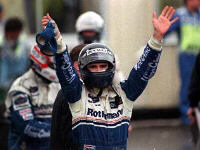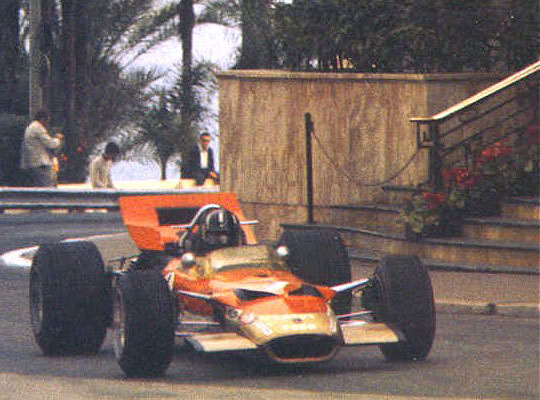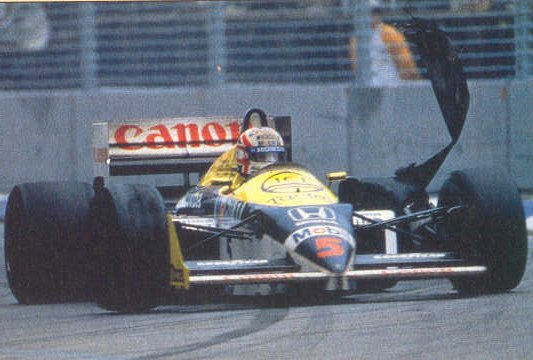Home
Jenson's Factfile
The Early years
Picture Gallery
Jenson's Race Results
The Renault R202
Sign the Guestbook
View the Guestbook
Join the Club!
Try my quizzes at Triv.net:
Formula 1 Motorsport
Links & Banners
More coming soon!






The first truly great british driver, it is a travesty of justice that Moss never won the title, but a measure of the man that when fellow Briton Mike Hawthorn's championship was called into doubt, Stirling himself stood up for him. A true gentalman and legend
Starts - 66 - Wins - 16 - Podiums - 24 - Poles - 16 - Fastest laps - 19
F1's last great amateur, Clark set the benchmark in the 1960s. Every driver had the utmost respect for him, Moss even said "I shall have to get a state-of-the-art car to beat Jimmy!" Quite simply, if you were going to win in the mid-60s, you had to beat this man, a task made even harder by his supreme mechanical sympathy.
Starts - 72 - Wins - 25 - Podiums - 32 - Poles - 33 - Fastest laps - 28 - Champion 1963 & 1965
Never the best driver, but often the most determined. Graham only got his driving license at the age of 24, but finished his career with two world titles to his name, and was particularly prominent at Monte Carlo, winning a then-record 5 times. He also won at Le Mans and the Indy 500. Very much one for a party, Hill was Formula 1's first celebrity
Starts - 176 - Wins - 14 - Podiums - 36 - Poles - 13 - Fastest laps - 10 - Champion 1962 & 1968
JYS was the total professional, and after Graham Hill had to pull him from a petrol-soaked BRM which found itself in a farmer's basement, he was a very firm capaigner for safety. After the deaths of Jim Clark and Jochen Rindt, Stewart found himself with few to challenge him, and won Tyrrell's three championships.
Starts - 99 - Wins - 27 - Podiums - 43 - Poles - 17 - Fastest laps - 15 - Champion 1969, 71 & 73
Ever the playboy - he even wore a badge bearing the ledgend "Sex, breakfast of champions" - James Hunt was the only one of the promising British hopefuls of the early 1970s to live to achieve any real success. After a stint at Lord Hesketh's team, James took his McLaren to the title in 1976 against good friend Niki Lauda, then struggled with bad cars until retirement in 1979
Starts - 93 - Wins - 10 - Podiums - 23 - Poles - 14 - Fastest laps - 8 - Champion 1976
This Ulsterman was famous for winning from the back of the grid, Winning in Detroit from 17th in 1982, and then doing even better from 22nd at Long Beach a year later. He was one of Hunt's sparring partners in the 1970s, but first found fame at home by winning the British grand prix in the new McLaren MP4-1
Starts - 152 - Wins - 5 - Podiums - 20 - Poles - 2 - Fastest laps - 5
What can one say about "the man from the Isle of Man"? Between 1985 and 1992, he was utterly loved by the British public. The man who drove with a red 5 totally dominated 1992, but should by rights have won in 1986, and was only stopped in 1987 by a painful crash in the penultimate round. He had grit and determination by the bucketfull, and mindblowing car control. He famously sold Nelson Piquet a dummy at Silverstone's Stowe corner in 1987, and afterwards he got a policeman to take him by moped to the spot where he promptly kissed the ground. All this was helped by Murray Walker's total bias, and "Our Nige" gave Murray some of his finest moments. After winning the Indy 500 and the Indycar championship in 1993, Nigel returned for four races in 1994, magically winning in Adelaide. But there wasn't a fairytale ending as Nigel left McLaren in 1995 after only two races
Starts - 187 - Wins - 31 - Podiums - 59 - Poles - 32 - Fastest laps - 30 - Champion 1992
Son of Graham, Damon originally intended to race motorbikes, but after a test in Formula Ford he took his career from there. He was signed as Williams test driver in 1991, and after a few outings for the struggling Brabham team, he got a race seat with Williams the following year. He excelled himself, being cruelly denied in Britain and Germany before taking a hat-trick of wins. After Senna died in 1994, Hill rose to the occasion, challenging Schumacher until a collision forced both out in Adelaide, giving the title to Schumacher by 1 point. The rivalry continued in 1995, but the pressure got to him. He finally won the title in 1996, and when Murray famously said he had a lump in his throat, we all knew what he meant. After moving to Arrows in 1997, Damon was robbed of a certain win by a hydraulics leak one lap from home. He did, however, win for Jordan at a soaked Spa in 1998.
Starts - 115 - Wins - 22 - Podiums - 42 - Poles - 20 - Fastest laps - 19 - Champion 1996